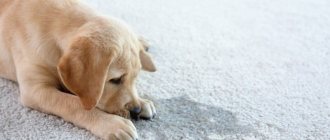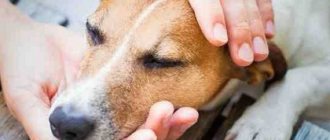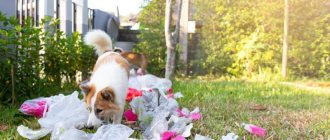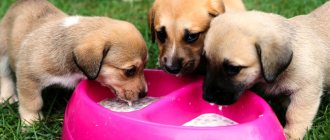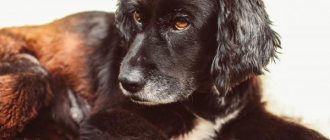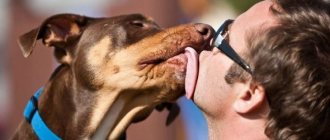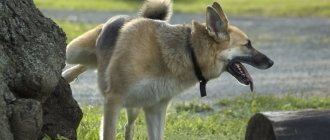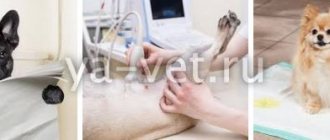The first thing we have to say in this HowMeow.ru article is about why do dogs eat their puppies?? This is not common. Although this can and does occur for reasons explained below, it is a minority of births. Mother dogs have a protective instinct over their newborn puppies. While it may seem counterintuitive, most of the reasons dogs eat their young are for survival. As much as we like to think about our dog's personality, we cannot impose human morality on them. They simply do not operate under the same social structures and customs. For this reason, it is important not to punish a mother dog for eating any of her offspring. This doesn't mean you can't intervene, but knowing whether it's recommended means you should know the reasons for the behavior.
The dog swallowed a foreign body - what to do?
The curiosity of our four-legged explorers knows no bounds. They are ready to try not only new treats, but also everything that comes their way. Is it any wonder that at one point they swallow some inedible object, be it a stick, paper or a piece of a rubber toy. Fortunately, in most cases, these things pass through the gastrointestinal tract without problems, surprising the owners at the exit with the quirkiness of the pet’s culinary preferences. However, sometimes the animal’s luck changes, and the foreign body becomes firmly stuck in the stomach or intestines.
Without a timely response, such a situation can cost the health and even the life of your four-legged pet, which is why it is so important to recognize the danger in time and seek help.
Possible consequences
We figured out why a dog can eat its own feces. You should also know that coprophagia is not actually considered a disease, but rather is classified as simply a nuisance or destructive behavior. In principle, “fragrant heaps” cannot cause significant harm to your pet, but only if we are talking about his own waste products and at the same time your dog is completely healthy.
It should be remembered that, having tried it once and not receiving a ban from the owner, the dog will definitely perform a similar action again and again. And this is already fraught with consequences.
What can enter a dog’s body with feces (even if the dog is supposedly healthy):
- Worms and other parasites . These organisms will slowly “eat” your pet from the inside, harming his well-being, mood, and health. In addition, do not forget that animal worms are transmitted to humans.
- Hazardous substances . For example, those contained in the soil (if this action occurred on the street) or in the floor covering.
- Infections . E. coli, viruses and microorganisms can cause serious health problems for your pet.
Consolidation of the habit of eating your own feces occurs if a person reacts to a problem at the wrong time or incorrectly.
What not to do
Sometimes, wanting to help a pet, owners, unwittingly, significantly worsen its condition by performing unnecessary or dangerous actions. What should you never do?
- Pull an object out of your throat or anus yourself. By trying to remove a protruding object, you can further injure the walls of the stomach or larynx. Removing hard or sharp objects, as well as bodies with jagged surfaces, is especially dangerous. It is no less dangerous to pull out various threads or ropes. As they pass through the gastrointestinal tract, they can become entangled or, when caught on something, lead to ruptures in the walls of the stomach or intestines.
- Give antiemetic drugs. Medicinal substances that block the urge to vomit do not improve the situation in any way, but only deprive the animal of the chance to get rid of the foreign body on its own and blur the clinical picture of the disease.
- Do an enema. Firstly, the enema irritates the intestinal walls, and secondly, if a foreign body leads to blockage, water, not finding a way out, can lead to rupture of internal organs and peritonitis.
- Give food or water. Any products entering the gastrointestinal tract cause new attacks of vomiting, which leads to rapid dehydration of the animal.
The following items pose a particular danger to our pets:
- Batteries. The acid contained in batteries can enter the dog's stomach, causing chemical burns and poisoning.
- Magnets. Small magnetic balls swallowed by an animal are unevenly distributed in the gastrointestinal tract and, through the walls of the stomach or intestines, literally stick to each other, pinching living tissues together. Necrosis and foci of inflammation very quickly form at the junction site.
- Cotton swabs. By absorbing water and increasing in size, tampons, firstly, accelerate dehydration, and secondly, they tightly clog the lumen, practically not moving due to the fleecy cotton structure.
- Threads and elastic bands. A long thread, despite its thinness, can cause great trouble. The rings of the gastrointestinal tract are literally strung on it and assembled into an accordion, also causing necrosis and rupture of sections of the intestine. An elastic band, when contracted, can cut tissue like a fishing line.
- Fillers for cat litter. Any liquid that gets on the filler granules causes them to stick together into a lump. Once in the dog’s stomach, the filler increases in size several times and causes obstruction.
Medical diagnosis
At the first sign of a foreign body in the gastrointestinal tract, we recommend that you immediately consult a doctor. Remember that such a problem is very difficult to diagnose, so to speak, “by eye” - only clinical studies can confirm or refute the diagnosis.
- Palpation of the abdominal cavity. If the foreign body is quite large and dense, for example, a rubber ball, it is quite possible that it can be felt through the walls of the stomach. However, even if nothing is found during palpation, this is not a reason to exhale with relief. A huge number of objects, for example, a rag, a bag or thread, cannot be felt by hand.
- X-ray. During the examination, stones, metal and rubber objects are clearly visible. Or, if the foreign body is not detected, the doctor may notice changes in the internal organs characteristic of the presence of a foreign body.
- Radiographic examination. To track the progress of an object through the stomach and intestines, a contrast agent (most often barium) is used, which is given orally to the dog.
- Endoscopy. Today it is considered the best method for diagnosing a foreign body.
- Laboratory research. To rule out other causes of your pet’s illness, the doctor may prescribe a blood test for a biochemical test.
Mother's relationship with her puppies
In general, a dog will know how to care for its offspring innately without seeking help from external sources. As soon as they are born, the mother releases them from the bag of water. This is the protective membrane in which the puppy leaves the mother's womb. The mother broke it with her teeth. Then lick the puppy to remove any secretions or fluid, it connects to your placenta and holds them close to keep them warm. Then they will eat their placenta and any other postpartum material.
Do all the previous steps instinctively, even if they are new mothers . This same instinct means they know how to walk around their nest area without trampling or damaging their newborn pups. Since this instinct is so acute, why can they eat their puppies? This behavior goes against your natural instincts.
Catsbri
Roxanne_Bryan | Editor-in-Chief | Email
It's a pet owner's and dog owner's worst nightmare: a mother killing her puppies. Whether the killing is targeted or accidental, looking at a dead puppy is enough to cause shock and disbelief.
This behavior, unfortunately, is not uncommon in the dog world. In fact, it has a name: “infanticide.” But why would a mother dog kill a puppy? There are many reasons, and not all of them should be condemned.
Second and third weeks of feeding
On the 6th day after birth, the dog can be given meat broths, and on the 10th day - small pieces of raw meat; there is no need to offer bones. From the 3rd week, the diet includes bone meal, vitamin complexes, fresh vegetables, herbs, and mineral supplements. To increase lactation, give tea or coffee drink with whole milk, walnuts, apilak. If a dog refuses to drink water, you can trick it: for example, pour a little melted butter into the water - it will attract the pet with its smell, and the dog will start drinking. Otherwise, you will have to supplement the dog’s food yourself: the more liquid, the better the lactation.
The fourth week is the same, from the fifth week the total amount of food for the dog can be reduced, but the calorie content should not decrease. At the same time, you can reduce the volume of liquid. During this period, puppies begin to introduce complementary foods.
What can the owner do?
The first thing an owner who plans to get healthy offspring needs to do is raise a dog with a balanced psyche that trusts people. Contact with the owner and members of his family allows the bitch to better adapt to what happened. The mother dog does not worry if familiar people clean up near the puppies, pet them or pick them up. Trust prevents the development of a psychological crisis, but you need to start developing it from the first days of this dog’s appearance in the house.
The second thing that is required from a person is to create suitable conditions for the life of the mother and offspring, provide quality feeding already at the stage of pregnancy, pay attention to psycho-emotional stress and decent walking. The mother's diet must contain calcium to prevent eclampsia, the entire set of B vitamins, especially B12, a sufficient amount of glucose for the functioning of the nervous system, protein and other important components.
Veterinarians, dog handlers and psychologists are unanimous in their opinion: if a dog has eaten offspring, then the animal must be removed from breeding and sterilized. Otherwise, the mother can pass this tendency on to her children.
An exception can be considered gross violations by the owner of the rules for keeping the mother and her walking. However, given that the animal has already experienced cannibalism and the dog found a way out of the situation in this way, it is better not to receive puppies from it in the future, so as not to encounter the eating of offspring again.
Be that as it may, animals act mainly according to the “demands” of their instincts. Do not rush to condemn them for any actions. Animals are not able to think and think like humans, to discuss a problem at a social level. Here is a harsh reality that is dictated by the laws of nature.
The manifestation of animal character does not depend on environmental conditions. Therefore, pets can behave in a way that is strange to you. For example, after giving birth, your dog may eat puppies. Why does this happen in dogs? For example, cats during childbirth eat the sac that comes out of them, in which the fetus was located, but does not eat kittens. A dog can do this.
Why does a dog eat puppies? Typically, a lot of blood is lost during childbirth. Perhaps after this the animal needs to regain its strength, and its instincts dictate what it needs to do. It's a little scary and looks like cannibalism. I can’t wrap my head around how she could! After all, my dog is the kindest and sweetest dog in the world. It may be possible to avoid such an act.
As already mentioned, the dog loses a lot of blood. Blood is a liquid. After giving birth, be sure to provide your dog with free access to a bowl of water. You can try giving her tea with milk so that her strength is gradually restored. After all, a dog eats puppies to restore its energy reserves, so provide it with nutrients so as not to lose one of the babies.
There is special food for dogs in the postpartum period. It contains the nutrients needed by a woman in labor. After giving birth, try to be more careful and careful with the dog. She, like any other female, remains in a stressful state for some time after childbirth.
She may react inadequately to sudden movements, or your approach to her and the offspring. She's especially angry now
Random breed:
Impressive individuals of this breed are distinguished by their nervous and restless disposition. More than anything else, they love fun and active games. Their long...
stress
Some dogs may kill their puppies if they feel stressed by not having a quiet, private place to keep their litter. There may be too many people coming to see the litter, or the litter may be too large for the dog to handle.
The dam's stress level could cause it to do the unthinkable. According to Nicholas Dodman in an article for Petplace, a Rottweiler mother killed her puppies after they were returned from a tailing. She may have assumed that the puppies were damaged or contaminated in some way and therefore destroying them was a way to put them out of their misery."
Is it dangerous for a dog to eat feces?
Eating feces is normal behavior for dogs. In most cases, this is absolutely safe for the animal, but there are exceptions.
Even if the dog likes the net of feces, then in any case it should be stopped, since there is always a risk of becoming infected with parasites (worms and helminths), viruses and bacteria. Additionally, some feces may contain medications from other animals that will be toxic to your dog. For example, anti-worm medications contained in horse manure.
If you can't stop your dog from eating feces, you should give him something to eat or drink to rinse his mouth.
Don't let the animal lick you. Wash your hands thoroughly if they come into contact with your dog's mouth or saliva.
Why is eating feces dangerous for a puppy?
Why is eating feces dangerous for a puppy? Intuitively, every owner knows that when a puppy eats its own or someone else's excrement, it is in danger, but what exactly is the threat?
Obviously, when eating feces, a puppy can become infected with worms, and of a wide variety of types. Most intestinal parasites have a simple development path. The adult lays eggs, they are released into the external environment with feces and are swallowed by future carriers.
In addition to worms, which are relatively easy to eliminate, by eating feces, a puppy can become infected with a variety of viral diseases. Parvovirus enteritis is considered a common viral disease that enters the external environment with waste products. There is a vaccine against this virus, but if you still come into direct contact with infected excrement, he will still get sick.
Parvovirus enteritis is characterized by rapid and acute development of the clinical picture. Literally a few days after infection, the puppy will begin to have severe diarrhea and vomiting. Constant irritation of the intestinal mucous membranes will lead to their death, which can lead to the death of the puppy if he does not receive qualified assistance. Moreover, even with high-quality and timely treatment, with a low level of immunity, there is a very high probability of the puppy’s death.
Why does a dog give up his puppies??
We have already seen that a mother mother can eat her children due to her instinctive behavior. We can think of this as reprehensible behavior, and the same thing can happen when they leave their trash. Early in its life, the mother should only leave her litter occasionally to feed or urinate. As the days pass, the mother will grow for longer periods. This gradual increase in separation time is intended to allow the puppies to learn to walk on their own. Puppies may cry when their mother is away, especially if they are hungry or need something else.
If the mother does not return for a significant period of time and ignores the cries of her pups, only then can we consider this abandonment of the mother. At this stage we will have to intervene if the puppies are going to do this..
At about 10 days of age, puppies begin the relatively slow process of opening their eyes. After about 15 days they will begin to use their legs to move around, and after 3 weeks they will begin the weaning process to eat solids. As these advances occur, they begin to spend more time with their siblings and less time with their mother. abandonment is .
Inexperienced or unstable mothers
The mother dog may have been bred too young - dogs should never be bred for the first time - or she may simply not be a stable mother.
In these cases, the mother must be removed and never allowed to reproduce again. As the puppies grow, the mother dog may growl and claw at the puppies, which require discipline, but in the first week the puppies become defenseless creatures who are completely dependent on their mother.
Usually during this time the mother will bond strongly with them thanks to the “bonding hormone” oxytocin. When this doesn't happen, problems arise.
Psychological reasons for eating offspring
All psychological causes of intraspecific cannibalism can be divided into those that are provoked by physiological factors and are characteristic of any breed, and those that are more common in shepherd dogs. Understanding the mechanism behind the development of the desire to eat puppies gives the owner a chance to prevent unwanted behavior.
Crisis of restriction of freedom
Shepherd dogs are naturally active, love to run a lot and have difficulty withstanding limited territory. When kept in an enclosure or on a chain, they develop many bad habits, such as chasing their tail. The same psycho-emotional disorder haunts the bitch if she is unable to leave the puppies on her own for a while.
A closed space without the possibility of long-term walking, contact with people and other animals, or psychological stress exhausts the mother, and if the puppies bother her, she may develop aggression. This is one of the factors inherent in mobile breeds, which include shepherds. It is not basic or frequent, but an owner planning to get strong and healthy offspring from a shepherd dog should carefully consider the daily routine of the bitch.
Physiological causes of cannibalism
Physiological reasons for eating offspring include exhaustion, frequent births and poor diet. The dog intuitively understands that it cannot feed all the puppies, and sacrifices the weakest ones in order to feed the rest.
A dog’s desire to bite and eat someone else’s offspring is not a pathology. Cannibalism in relation to one’s own can be provoked by the peculiarities of the nervous system. With a lack of glucose and B vitamins, the transmission of nerve impulses and the dog’s corresponding behavior are distorted. She may develop uncontrollable aggression, reject puppies, or even eat them. These same mechanisms explain postpartum depression after a difficult birth. The bitch is exhausted, dehydrated and has suffered major blood loss. If the owner notices an inadequate reaction of the dog to the puppies, then it is better to take them away and bring them only for feeding so that the mother can rest and recover. There is no need to be afraid that the dog will not develop a maternal instinct. The danger of cannibalism is more serious and justified.
From a natural point of view, it is natural to eat weak, non-viable offspring. It can be called an evolutionary mechanism of protection against the emergence of defective dogs. However, if among the offspring there are weak individuals or puppies with pathologies, then this indicates that the process may be genetic, so it is better to exclude such a bitch from breeding.
The dog mauled and ate the puppy
Stress in dogs Olga Kazharskaya 02/20/2010 15:26
Article for the magazine "World of Dogs". Stress and behavior problems.
Olga Kazharskaya, dog psychologist of the Tyurid Rugos school, founder of the canine publishing house Dogfriend Publishers. In her numerous articles, Olga talks about the emotions and intelligence of dogs, about their language, signals of reconciliation and ways to create good social contact between the owner and the dog, which is often disrupted due to the dogmas of the past.
Until recently, the state of stress in dogs was practically not studied. This was an area that was traditionally classified as veterinary medicine and not associated with canine science, although almost the entire history of canine science can be called the history of stress in dogs.
Lifelong keeping of dogs in an enclosure or on a chain, social isolation, punishment, strict collars and leash tugs, training in tiny noisy areas crowded with other dogs are just a short list of reasons that cause stress.
Remember also the common idea that you need to talk to a dog in a rude, low voice, keep it in fear, “so that the dog is afraid”, about the use of baiting to train the so-called “guard dog”, or one of the most successful myths of humanity about “dog dominance” " in family! I'm not even talking about the consequences of inept breeding. All these methods have spread and become so familiar that they seem to be something taken for granted.
We don’t really think about what we are condemning our dogs to, because we are accustomed to their patience and affection for their owners - their closest social partners: a dog does not choose the house in which to live, while a person “tired” of behavior problems his pet often resorts to all sorts of means of pressure: correction, punishment, or even a death sentence.
But stress in dogs does not go unnoticed: in addition to physical diseases, it is the most common cause of behavioral disorders. Therefore, this topic deserves special attention not only from veterinarians, but also from everyone who communicates with a dog, be it an owner or a specialist.
Research conducted in 2002 by a group of German and Norwegian dog experts led by Thurid Rugos showed that dogs are very sensitive to everything that surrounds them. Even the most seemingly insignificant factors can put them into a state of stress, such as postures, movements and voice of the owner, lack or excess of communication, the presence of another unpleasant dog in the house, insufficient or excessive physical and/or mental activity, loud music and much more. other.
Dogs express the slightest internal tension with microsignals of stress, also called signals of reconciliation. If internal tension intensifies and persists long enough, stress begins to manifest itself in more significant changes in behavior: the dog becomes agitated or, on the contrary, depressed, absent-minded, displays aggression, begins to chew furniture, eat inedible objects, barks a lot, has difficulty learning, behaves restlessly on a leash.
In addition to the many factors that cause stress in dogs, researchers have identified about 40 signs of stress that help identify a dog's stress state and find its cause.
Interestingly, many stress-related behaviors are traditionally considered behavior problems! As a result, they are trying to eliminate them through correction, including harsh training, as well as the use of various mechanisms.
For example, unbridled barking at the door, caused by fear of the arrival of strangers, was “corrected” with an electric shock collar or an Anitilay collar - instead of giving the dog a sense of security and teaching it not to be afraid of guests. Another example: a trainer advises owners to ignore a dog for several days if it chews furniture while staying at home alone. So a dog that is bored or afraid of being alone is subject to additional stress from social isolation and becomes even more fearful and insecure. Disturbed sexual behavior is considered “dominance”, and the dog’s behavior is corrected with the help of alpha throws and all kinds of suppression of its desires. The stress that she will experience during such “training” inevitably leads to even more serious behavior problems, and sometimes even death. The tendency of dogs to pick up trash on the street, among other possible factors, can also be a manifestation of stress.
We consider many signs of stress to be simple illnesses and contact the veterinarian, although the dog’s health could be restored by simply eliminating the cause of the stress. For example, allergies, dandruff, hair loss, and digestive disorders can be caused by social stress in the family or participation in too strenuous activities.
Another case, described in the consultation section on one of the dog Internet sites, was a dog showing several symptoms of stress at once: excessive barking at home (including at the noise of household appliances) combined with an overexcited state during a walk and a decrease in training performance. Moreover, the owner reported that the dog sat at home alone for months, 10 hours a day, locked in the kitchen, and went for a walk 2 times a day for 20 minutes. All behavior problems are clear signs of stress caused by the animal's constant physical and mental underload, as well as a lack of social contact. However, the consultation addressed these violations as separate issues. And this is not surprising, since stress as a factor in changing the dog’s condition was not taken into account, and the emphasis was on education and “suppressing the ambitions” of the dog. Therefore, the owner was offered behavior correction through training and punishment. The owner's reaction to changes in the dog's behavior, which does not take into account the true reasons for such changes, can give rise to an endless chain of useless and often harmful measures for the dog.
Most stressors are created by the owner himself, and only a few types of stress are natural. For example, many dogs are afraid of thunderstorms or firecrackers, going to the doctor or groomer, having a hard time being separated from a close family member, etc. In these cases, the winner is the one who created the most trusting contact with his dog, who tried to protect him from the unnecessary stress of everyday life, treated him attentively and did not subject him to the torture of harsh training and punishment. If misfortune befalls a dog, it is able to overcome troubles without injury. Moreover, by trusting the owner, the dog orients its reaction towards them even in unpleasant situations! This means that the owner can calm the dog simply by remaining calm. And only in exceptional cases, for example, in a state of uncontrollable panic, does it become necessary to support the dog with sedatives.
So, we should always be aware of the sensitivity of our dogs. They live next to us in our complex human world and yet they try to do everything that we demand of them. They try to understand us and value us very much as their social partners. Unlike wild animals, they are patient with our mistakes. But they, just like ourselves, have a receptive, highly developed nervous system. Therefore, just like us, they can experience and suffer from stress. It's surprising we didn't think of this before!
How to stop your dog from eating puppies?
Since dogs that eat their young are acting instinctively, it's not really something we can interfere with these days. Puppies need to be with their mother and we should not take them prophylactically as we are harming their chances of survival. Once a dog starts eating the puppy, it will often be too late to do anything about it.
What we can do is try to prepare as favorable an environment as possible for birth. We can try to influence factors that will lead to healthy puppies and a happy mother's mental state. In turn, we can reduce the likelihood of complications during and after childbirth. This means ensuring proper nutrition during pregnancy and taking them for veterinary supervision when necessary. Under no circumstances should we feed them supplements without express permission from a veterinarian. This can lead to miscarriages. It is also advisable to make sure that there is no additional stress for the dog and that he has a comfortable environment...
If we see that all the puppies are alive but the mother has abandoned one or any of them, we should immediately take the puppy to the vet to see if anything is wrong. Once you have confirmed your health status, you can think about how to feed your abandoned puppy.
Question answer
If a dog eats poop, is it missing something?
Often, a pet begins to eat feces when it lacks nutrients from the food given by its owners. It is necessary to review the dog’s diet, consult with a specialist and make adjustments to it. While the dog is being transferred to a new diet, eating feces will have to be stopped (for example, by wearing a muzzle while walking).
Eating cat feces - is it normal?
The smell of any feces is recognized by animals as markings of territory. Dogs can easily eat the feces of a cat who lives in the same house with them because of jealousy. Thus, the territory is cleared of the “presence of a competitor.” At the level of animal psychology, such a gesture is quite natural.
Should you scold your dog if it eats its own poop at home?
You can’t immediately start scolding your dog for starting to eat feces. If such behavior is noticed, contact a veterinarian, ruling out internal diseases, and then just start weaning off such behavior.
Dog eats baby's poop from potty
The appearance of a child in a family can provoke feelings of jealousy in a pet. By eating baby feces, the animal clears the territory of someone else's smell, leaving ownership of the territory for itself. In this case, malnutrition, lack of nutrients or internal diseases must be excluded. Try to clean up the potty after your child in a timely manner to avoid temptation for your pet and to prevent a single gesture from becoming a habit.
In this article I will look at one of the bad habits of dogs - eating excrement. I will list the problems of a pet, why it eats its own feces, human or cat. I’ll tell you how to wean your dog from a bad habit and what to do.
Why do dogs eat dead puppies???
The idyllic version of a puppy's entry into the world, as described above, does not always take place when the dog gives birth. Although it is not common, the puppy may be stillborn or not strong enough to live long after birth. They may have been injured when they left the birth canal or were simply underdeveloped during pregnancy. Although it is not entirely clear, the mother may not realize that the puppy is her offspring . If the puppy does not have a heartbeat, it can be considered another part of the postpartum period. They eat it because they think it is waste material.
If we see that a mother bitch has eaten her puppy, it is likely that she has died. They may know about it, but we cannot know the exact motivation behind the behavior. Further research is needed, but it is also possible that we will never know past hypotheses due to communication limitations between dogs and humans.
Another possible reason is that the puppy is showing signs of weakness or illness. Although we may be inclined to do everything we can to help a weak or premature baby, we benefit from modern medicine. Dogs still have an instinct close to their wild cousins. Much of his behavior is related to survival. A sick pup can make the rest of the litter sick and weaken the group's chances of survival. The mother may eat the puppy they think is sick in order to save the rest of the group...
One way a mother can tell if a puppy is sick is by recording its temperature. The mother may not eat them, but she can drive them out of the nest. It may seem so cruel to us, but the behavior is instinctive. It is also possible that the reason the puppy is not feeling well is because the mother is biting them when trying to chew the cord or eat the continuation. This could be a simple accident or because the mother is having difficulty getting hold of the puppy. This is thought to happen more often to new mothers.
The mother may also suffer a miscarriage before the puppy is termed. If this is the case, the mother may eat the fetus when it is eliminated. To learn more about puppy pregnancy, you can check out our weekly dog pregnancy details.
Preventing Death
Puppies are very vulnerable as newborns. To keep them safe and sound, it is best to monitor the litter closely for the first few weeks and look for puppies that are feeding and acting normally.
Also, observe the mother's interactions and take note if there are any abnormal behaviors. Sleep near trash for the first few days. This way, if you hear muffled screams, you can go to help.
In general, you should always take the mother and her puppies to be examined by a veterinarian 24 hours after birth to ensure there are no retained placentas and that the puppies are in good health.
How to eliminate stress and nervousness?
Some owners diligently balance their pet's diet, conduct vitamin courses and reach a dead end, since all these measures do not solve the problem of eating excrement. What to do if your puppy eats feces due to stress?
If your baby has recently moved into your home, it is wiser to monitor his movements and actions, make sure he does not eat feces, but do not take any drastic measures. Most likely, within two weeks the baby will adapt to the new place of residence, and the problem will solve itself.
The puppy is growing up, has already settled into its new home, but continues to hunt for excrement? In this case, it is wiser to take a course of sedatives. Light sedatives, which have virtually no contraindications or side effects, are sold in pet stores. Carry out a course of treatment and monitor your pet. If no progress in behavior is observed, consult a doctor and obtain a detailed history.
